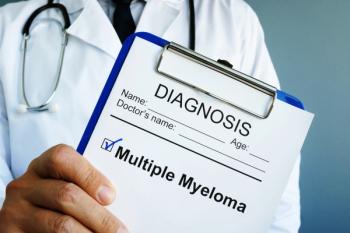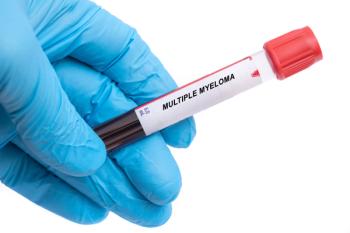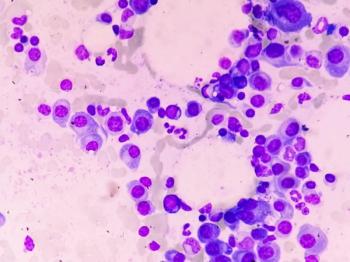
Multiple Myeloma
Latest News
Latest Videos

CME Content
More News

CD38 density may indicate the efficacy of monoclonal antibody treatment in patients with multiple myeloma.

The decision is based on positive results from the PERSEUS trial.

Early identification of monoclonal gammopathy of undetermined significance leads to more efficacious disease monitoring and intervention.

Increased levels of absolute lymphocyte count are associated with improved response to BCMA-targeted CAR T-cell therapy.

β2-microglobulin may be an effective indicator of coagulation dysfunction in patients with newly diagnosed multiple myeloma (NDMM).

IMROZ study data show Isa-VRd may be a new standard of care.

Radiotherapy may have applications beyond symptomatic relief when used in combination with immunotherapy.

Researchers identify significant proteins involved in the growth and survival of malignant multiple myeloma cells.

Omar Nadeem, MD, discusses positive outcomes associated with GPRC5D-targeted CAR T-cell therapy.

Chimeric antigen receptor (CAR) T-cell therapy can engineer T cells to target malignant cells in multiple myeloma.

The monotherapy is compared with the combination regimen of elotuzumab plus pomalidomide and dexamethasone in adult patients with relapsed or refractory multiple myeloma.

An interdisciplinary discussion addresses the disparity in availability and use of these therapies across the continuum of care.

The quadruplet regimen added bortezomib to the current standard of care, which is a triplet regimen of isatuximab, lenalidomide, and dexamethasone for patients with transplant-ineligible, newly diagnosed multiple myeloma (NDMM TI).

Ryan Haumschild discusses the evolving treatment landscape for patients with multiple myeloma.

Observation time on subsequent injections of subcutaneous daratumumab may be safely removed from institutional policies to reduce chair time.

Amplification of chromosome 1q is associated with poorer treatment outcomes for patients with relapsed/refractory and newly diagnosed multiple myeloma.

Data from the PERSEUS trial supports use of daratumumab in combination with bortezomib, lenalidomide, and dexamethasone followed by daratumumab and lenalidomide maintenance as a new standard of care for patients with newly diagnosed multiple myeloma.

Results from the initial safety run-in of MajesTEC-7 indicate that the combination of teclistamab, daratumumab, and lenalidomide in newly diagnosed multiple myeloma (NDMM) shows a manageable safety profile with early signs of efficacy.

The study showed that belantamab mafodotin plus pomalidomide and dexamethasone (BPd) significantly improved progression-free survival compared to pomalidomide plus bortezomib and dexamethasone (PVd).

Daratumumab in combination with standard treatment regimens shows benefit in multiple myeloma.

Quadruple therapies including immunotherapy agents show promise in treating patients with multiple myeloma.

Sarah Rockwell, PharmD, BCOP, and Ke Ning, MD, share their concluding remarks, reflecting on the current landscape and expressing their aspirations for addressing remaining unmet needs.

Ke Ning, MD, describes similarities and differences when implementing bispecific antibodies and CAR T-cell therapy for patients with relapsed or remitting multiple myeloma in the community oncology setting.

Medical professionals highlight the essential support provided by pharmacists in addressing operational challenges related to bispecific antibodies. Pharmacists can play an important role in the development of policies and procedures, monitoring and management of toxicities, and delivery of educational resources.

Isatuximab is used in combination with bortezomib, lenalidomide, and dexamethanose.



































